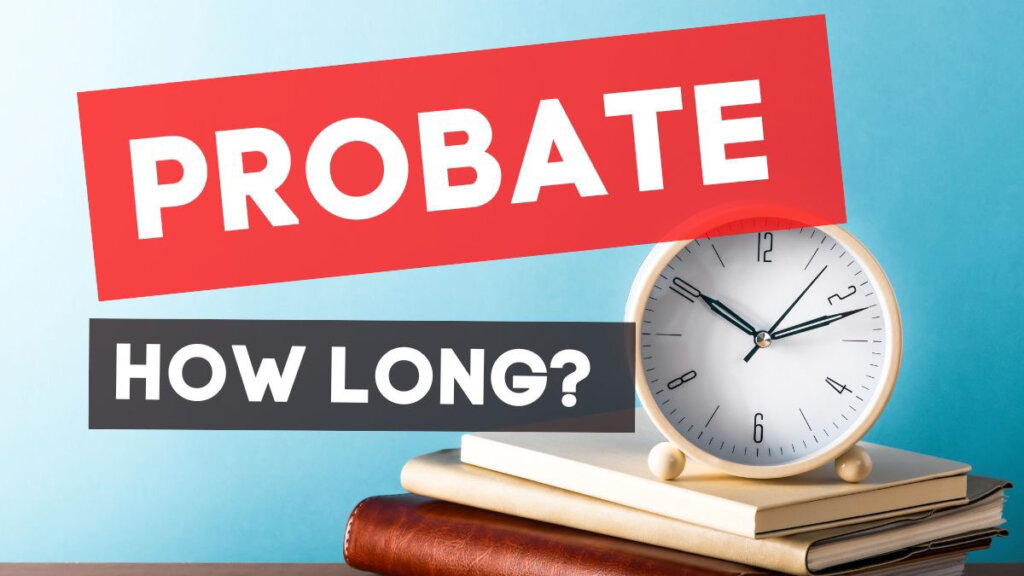How Long Does Probate Take in Connecticut?

Introduction
If you’ve found yourself asking, “How long does probate take in Connecticut?” you’re likely navigating a difficult situation. Whether you’ve recently lost a loved one or are handling the affairs of an estate, you’re probably dealing with a lot of questions and concerns about the probate process. You want to understand the timeline to make informed decisions about next steps—especially if you’re considering selling a house that is part of the estate.
One of the most pressing questions might be: How long will I be stuck waiting to sell the house? You might be wondering whether it’s better to wait until probate is fully resolved, or if you can sell the property sooner. Another concern could be the financial aspects—how much will probate cost, and how will it affect the overall value of the home? With so much uncertainty, the idea of quickly selling a house “as-is” to an investor might seem like an attractive option, but is it feasible? These are all valid concerns, and this blog will walk you through the probate process in Connecticut, help you understand the timeline, and show you how selling your house might fit into the equation. We’ll also explore the advantages and disadvantages of waiting for probate to finish versus considering other options, such as selling the property directly to a cash buyer.
Understanding the Probate Process in Connecticut
Probate is the legal process that verifies the validity of a deceased person’s will, identifies and inventories their property, pays any debts, and distributes the remaining assets according to the will or state law. In Connecticut, this process takes place in the probate courts, which are responsible for overseeing the estate administration.
In general, probate in Connecticut can take anywhere from 6 months to 2 years, depending on the complexity of the estate. The probate process involves several stages, including filing the will, inventorying assets, resolving debts, and distributing property. If the decedent owned real estate, it may be necessary to appraise the property, and if there are disputes among heirs, the process can take even longer.
Most people asking how long probate takes are likely trying to figure out how soon they can sell a house that’s tied up in the process. While the property can technically be sold once the probate process begins, it often takes longer to get permission from the court. And while it may seem like a long wait, it’s important to understand that selling the home early can be complicated, especially if the heirs are not yet legally entitled to sell.
For more information on the Connecticut probate court system, check out this guide to Connecticut probate law.
How Probate Affects Property Sales
If you’re looking to sell your house fast during probate, you’ll need to navigate several hurdles. Probate court approval is typically required before any real estate transactions can take place. In some cases, the court will require a formal appraisal of the property to determine its value. The estate executor may also need to obtain permission from the court before accepting any offers. These additional steps can delay the sale process.
If you’re wondering whether you can sell your house for cash during probate, the short answer is yes—but only with court approval. This is where selling to a house buying company near you might be a good option, as these companies are often familiar with probate and can sometimes expedite the process. However, the timeline will still largely depend on how quickly the probate court moves and whether the heirs or executor agree to the sale.
Costs of Probate in Connecticut
Probate isn’t free. The costs can vary depending on the complexity of the estate but generally include:
- Court Fees: In Connecticut, probate court fees can range from $150 to several thousand dollars, depending on the size of the estate.
- Executor Fees: The executor of the estate is typically entitled to a fee for their work, which can be a percentage of the estate value (usually 2-4%).
- Attorney Fees: If an attorney is hired to handle the probate process, their fees can also add up quickly. Expect hourly rates ranging from $250 to $500, depending on the attorney’s experience and the complexity of the estate.
When all is said and done, probate can end up costing a significant portion of the estate, which may impact the amount of money available for distribution or sale of the home. This is another reason why some heirs might be interested in selling the house quickly through a cash home buyer or house buying company—to avoid additional expenses and move forward with settling the estate.
For a deeper dive into probate costs, you can visit this resource on probate costs in Connecticut.
How Long Does Probate Take in Connecticut? Timeline and Delays
The length of time probate takes in Connecticut depends on several factors, including the complexity of the estate, whether the will is contested, and whether any debts need to be resolved. On average, probate takes 6 months to 2 years. However, here’s a breakdown of the typical timeline for Connecticut probate:
1. Filing the Will and Petition for Probate (1-3 months)
Once the death has occurred, the executor (or administrator) must file the will and a petition for probate with the local probate court. The court will review the will, appoint the executor, and grant letters of testamentary authority, which gives the executor the legal right to manage the estate.
2. Inventory and Appraisal of Assets (2-6 months)
The executor must identify and appraise the assets of the estate, including real estate, bank accounts, personal property, and investments. This process can take several months, especially if there are difficult-to-value assets.
3. Resolving Debts and Claims (3-6 months)
The executor must notify creditors of the decedent’s death and allow time for them to file claims against the estate. If there are disputes about debts or the estate’s value, this can delay the process.
4. Distributing Assets (1-3 months)
After debts have been resolved, the remaining assets can be distributed to the heirs. If real estate is involved, the process might take longer, especially if it requires court approval for a sale.
In Connecticut, most estates without major complications can complete probate in about 9-12 months. However, the process could take longer if there are complications, such as disputes between heirs, a lack of liquidity in the estate, or the need to sell real estate to cover debts.
Should You Wait for Probate to Finish Before Selling?
While waiting for probate to finish is often the default option, it’s not the only choice. If you need to sell your house for cash to settle debts, handle the estate, or simply move on with your life, there are options that can expedite the process. Here’s a comparison of your options:
Option 1: Wait for Probate to Finish
The main advantage of waiting for probate to be completed is that it provides clear legal ownership and a smooth title transfer. This is especially important if there are multiple heirs and potential conflicts. However, waiting means that the estate could be tied up for months or even years, and you could incur additional costs in the meantime.
Option 2: Sell to a Cash Buyer or Investor
Selling your house as-is to a cash buyer or real estate investor can be an attractive option if you need to move quickly. Many investors are experienced in purchasing probate properties, and they understand the legal complexities.
While the court still needs to approve the sale, cash buyers can often move quickly and streamline the process. This can help you avoid costly repairs, the lengthy process of listing the home with a realtor, and any delays that might come from probate.
However, there are some trade-offs. Selling to an investor might mean receiving a lower offer than you would through a traditional sale. But when you factor in the time saved, the costs avoided, and the stress reduced, selling for cash could be the most beneficial option.
For a more detailed understanding of how selling your house for cash works during probate, see our page on What Is the Probate Process in Connecticut?.
Option 3: Sell Without Probate Completion
In some cases, you may be able to sell your house without completing probate, but this is a complicated process that requires permission from the court. This option is rare and may involve more paperwork, and you’ll likely need an attorney to assist with navigating this route.
The Bottom Line: Should You Sell Your House During Probate?
When dealing with probate in Connecticut, it’s important to weigh your options carefully. The process can be time-consuming, costly, and emotionally draining. While it’s possible to sell a house during probate, the timeline can be unpredictable, and navigating the legal complexities can be overwhelming.
If you can afford to wait, completing the probate process might be the best option to ensure a smooth and legal transfer of ownership. However, if you’re looking to move quickly, settle the estate, or avoid costly repairs and realtor fees, selling your home directly to an experienced investor might be the right choice.
At Green Apple House Buyers, we specialize in helping homeowners sell their property quickly and hassle-free—especially in complex situations like probate. If you need to sell your house fast, sell your house as-is, or need a fair cash offer without the lengthy wait, we are here to help. We understand the probate process and can assist in getting the sale approved with minimal delay.
Whether you’re dealing with a challenging probate situation or simply want to sell your house without the typical headaches, Green Apple House Buyers is here to offer a smooth, efficient solution. Contact us today to get a cash offer and move forward with confidence.
